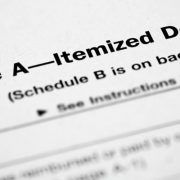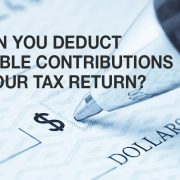5 Moves To Make Before Year End That Can Save You A Lot of Money on Your 2023 Taxes
5 Moves To Make Before Year End That Can Save You A Lot of Money on Your 2023 Taxes
On August 16, 2022 President Biden signed the 2022 Inflation Reduction Act which has some favorable tax changes you should be aware especially now that we are approaching the end of 2023.
Major Changes From The New Law Include:
A three-year extension of expanded Affordable Care Act health insurance subsidies, which were set to expire at the end of 2022.
Expanding residential clean energy tax credits and clean vehicle tax credits to promote clean energy incentives.
Returning to a 50% deduction limitation for business related food and beverages starting January 1, 2023.
The Big Picture:
With many itemized deductions having disappeared by the 2017 Tax Cuts And Jobs Act and a higher standard deduction, less taxpayers will be itemizing deductions in 2023 but there is still significant tax planning you can do.
For 2023, the standard deduction amounts are: $13,850 (single); $20,800 (head of household); $27,700 (married filing jointly and surviving spouse); and $13,850 (married filing separately). The additional standard deduction amount for taxpayers who are 65 or older or blind is $1,500. This additional amount is increased to $1,850 if the individual is also unmarried and not a surviving spouse.
If your itemized deductions in 2023 will be close to your standard deduction amount, consideration should be given to paying certain deductible amounts (such as medical and charitable expenses) in 2023 rather than 2024 to the extent possible, or vice versa. In other words, determine whether bunching deductions in one year and taking the standard deduction in alternate years can provide a net-tax benefit over the two-year period.
Following are five year-end tax moves to make before this New Year’s Day:
- Give more to charity in 2023.
In addition to the usual dollar donations to charities, religious institutions and educational institutions, consider clearing your home of those unwanted household goods and clothing to give to charities. Many groups will accept these items even vehicles, with some even making arrangements to pick up them up from your home. You may also consider to donate stock or mutual funds that you’ve held for more than a year but that no longer fit your investment goals. The charity gets the asset to hold or sell, and your portfolio re-balancing nets you a deduction for the asset’s value at the time of gifting. Even better, you do not have to worry about capital gains taxes on the appreciation of your gift. Remember that if you take the standard deduction in 2023, you won’t get any tax savings from your charitable contributions made in 2023.
- Make the most of your home – mortgage interest.
Home-ownership provides a variety of tax breaks, some of which you can use by year-end to reduce your current year’s tax bill. Make your January mortgage payment by December 31st and deduct the mortgage interest on your 2023 tax return.
- Make the most of your home – property taxes.
Like prepaying mortgage interest, the same tactic will apply for property taxes; however, keep in mind that property taxes along with other state and local taxes will be deductible only up to $10,000.
- Pay your self-employed business expenses
If you are self-employed, you should accelerate payment of your business expenses in 2023. Recognizing these expenses in 2023 will provide you with a tax savings for 2023.
- Defer your income into 2024.
If you are a small business owner, consider delaying income until January 2024. So if you are chasing up some customers or clients to pay the bill you sent them a while ago, you might want to wait until January to get aggressive on collecting. Consider delaying the delivery of invoices for year-end jobs until January 2024. Small business owners should make sure they are benefiting from the deduction of 20% of their business income. If you are an employee, ask your boss to hold your bonus until January. Individuals should also consider putting more money into a tax-deferred workplace retirement plan in 2023 and hold off on selling assets that will produce a capital gain until 2024.
What Should You Do?
With not much time left in 2023 you will need to act quickly on those tax moves that are easy to accomplish to reduce your tax bill.
You know that at the Law Offices Of Jeffrey B. Kahn, P.C. we are always thinking of ways that our clients can save on taxes. If you are selected for an audit, stand up to the IRS by getting representation. Tax problems are usually a serious matter and must be handled appropriately so it’s important to that you’ve hired the best lawyer for your particular situation. The tax attorneys at the Law Offices Of Jeffrey B. Kahn, P.C. located in Orange County (Irvine), Los Angeles and elsewhere in California are highly skilled in handling tax matters and can effectively represent at all levels with the IRS and State Tax Agencies including criminal tax investigations and attempted prosecutions, undisclosed foreign bank accounts and other foreign assets, and unreported foreign income. Also, if you are involved in cannabis, check out what our cannabis tax attorney can do for you. Additionally, if you are involved in cryptocurrency, check out what a bitcoin tax attorney can do for you.











 Follow
Follow Follow
Follow